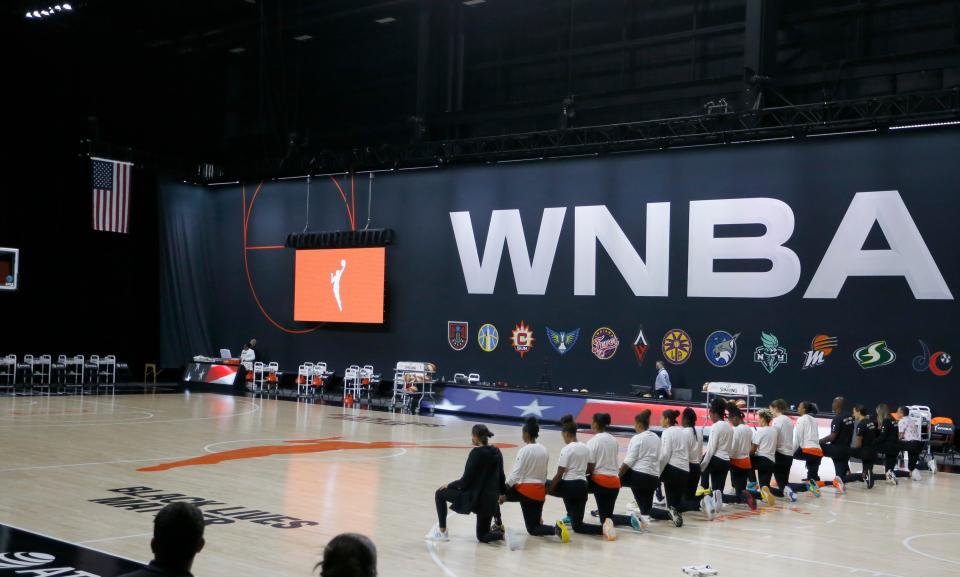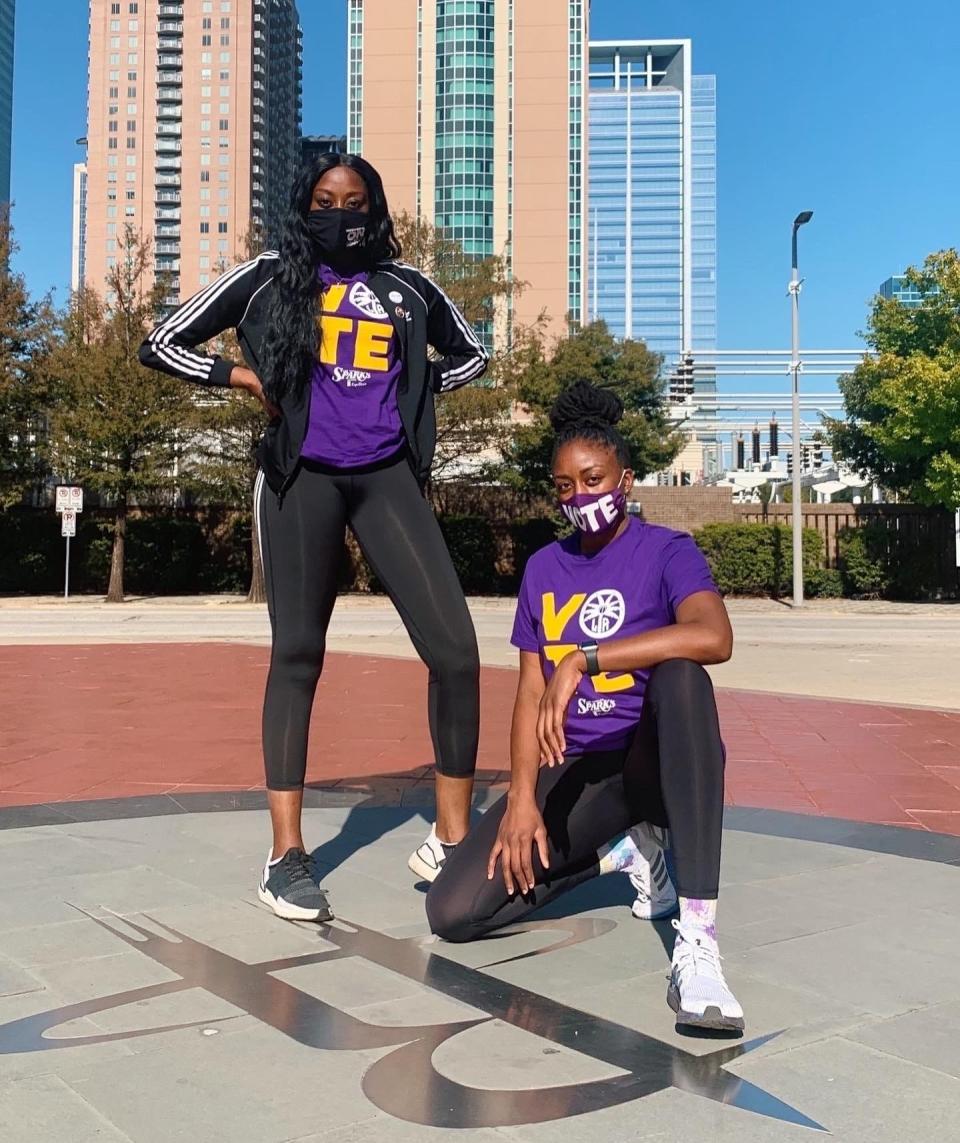ESPN's '144' chronicles WNBA players' bravery amidst racial reckoning, pandemic
- Oops!Something went wrong.Please try again later.
- Oops!Something went wrong.Please try again later.
- Oops!Something went wrong.Please try again later.
- Oops!Something went wrong.Please try again later.
With tears leaking from her eyes onto her mask-covered cheeks, Tiana Hawkins looked at her 5-year-old son, Emanuel, and uttered the words, “You wouldn’t understand,” as he asked her why she was crying. Hawkins, standing outside the basketball court, wearing a shirt with seven bullet holes sketched on the back, was faced with the reality of explaining to her young son what was transpiring inside the WNBA bubble after the Jacob Blake shooting in Wisconsin.
Hawkins of the Atlanta Dream was one of the 144 athletes inside the bubble at IMG Academy in Bradenton, Florida, who played a 22-game schedule from July to October 2020. The 147 total games were played with the backdrop of the COVID-19 pandemic and racial reckoning across the country.
These athletes lived and worked together, pushing their limits to complete the league’s unconventional season — a unique journey that was chronicled by ESPN in "144," a documentary that will premiere May 13 at 9 p.m. ET.
"For these women to be so authentic and open with us, is not a trust that we take lightly," Jenna Contreras, one of the directors, told USA TODAY Sports. "It was important to us to represent them as they are. They are strong. They are vulnerable. They had resilience in everything they did in this documentary.”
Contreras and Lauren Stowell's goals as directors were to cover five core topics: the season happening inside of a bubble, the pandemic, social injustice, mental health and motherhood. This was amplified because 80% of the league is Black.
More: WNBA star Liz Cambage blasts Australian Olympic Committee for 'whitewashing,' threatens Tokyo boycott
More: Picture perfect career: Hall of Fame only part of Tamika Catchings' journey
Los Angeles Sparks forward and director Chiney Ogwumike, a two-time WNBA All-Star and multi-platform ESPN commentator, worked with the league, ESPN and producers to create "144," an in-depth look at the league’s 24th season.
“There was enthusiasm, and I think you know as a league that’s predominantly full of Black women, we knew that we had to make the most of this moment, having a camera there and showing the realities of what we were going through and what we were experiencing, because it’s bigger than us,” said Oguwmike.
Ogwumike believes that because she is a Black woman and WNBA player she was able to strip down barriers of athletes and the camera.
Although Ogwumike spent her summer outside the bubble, as the vice president of the WNBA player’s association, she made it her mission to amplify the players' work on the ground. This included going on "SportsCenter," "First Take" and "The Jump" and educating the audience on why these athletes should use their platform for activism.

“Far too often do we show Black women in a struggle. We need to start showing Black women their successes and their strength,” Ogwumike told USA TODAY Sports. “One thing on the forefront of my mind as an executive producer was ‘yeah we can show vulnerabilities of women that will continue to hold it down for the culture, but we also need to show their strength as superheroes.”
One of the 144 women inside the bubble was Nneka Ogwumike, Sparks forward and sister to Chiney. “We all had a play to play in that amazing season. Mine was different from my sister’s, both nonetheless, amounted to something amazing,” said Ogwumike. Nneka is the president of the player’s association and played a vital role in facilitating the season dedicated to social justice.
From warmup shirts with “Say Her Name” printed on the back to honor the life of slain EMT Breonna Taylor to teams wearing shirts supporting political candidates to social justice messaging painted across the courts, , each day of the season represented much more than basketball.

The shortened season pushed athletes to perform at the highest level with minimal off-days and games almost every other day.
Contreras and Stowell wanted to give viewers a candid look at the women inside the bubble.
“If these women were going to speak their truth and share their vulnerabilities and put trust in us, then 100% the most important thing to us was to tell their story accurately," Contreras told USA TODAY Sports.

It was imperative for Contreras and Stowell to humanize the players and show an audience that they represent more than basketball alone, through scenes that dove deep into the conversations had throughout the season about social justice. .
“When you say social justice, there’s a human life behind that. When you see a hashtag, there is a life behind it," Stowell said. "There is an actual emotion behind it. There is a person that is tied to that that has real meaning in these communities. We wanted to go as deep with the platform we have, but also not dwell too much on the negative because there is so much strength in these women."
One of the last interviews conducted for the film was with Tamika Palmer, the mother to Taylor in Louisville, Kentucky.
“I still have a hard time watching that,” said Stowell. "But at the same time, to know that what these women are doing gives her any amount of comfort in her grief — there aren't even words for that. We didn't even know how deep that went. Even just the support of her knowing that they’re advocating and fighting when she did not get justice and Breonna still has not gotten justice. To hear that, felt like progress and Jenna and me. As much as there is no justice in that moment, there is still hope. There is still a human spirit. These women are still connected in a real way.
“Her daughter is a human. That was her daughter. That was her baby. And I think in that moment you realize the injustice of it. You see the stark reality of (Kentucky Attorney General) Daniel Cameron delivering that there will be no charges and to see this mother’s grief — but that there is still light and there are still good people in the world, like these women."
When the film premieres on Thursday, the day before the WNBA tips off its 25th season, Stowell and Contreras hope viewers take away a message of “empathy for people and empathy for people that do not look like you and how strong and powerful people can be when they are faced with some of life’s worst situations," Contreras said.
"These women’s stories deserve to be seen and to be heard. They are role models. They are amazing,” said Stowell. “They need a voice. Other athletes have their platform and get their shine. The women in the (WNBA) have not in the way that they deserve."
Contact Analis Bailey at aabailey@usatoday.com or on Twitter @analisbailey.
This article originally appeared on USA TODAY: ESPN's '144' chronicles WNBA players' bravery amidst racial reckoning

